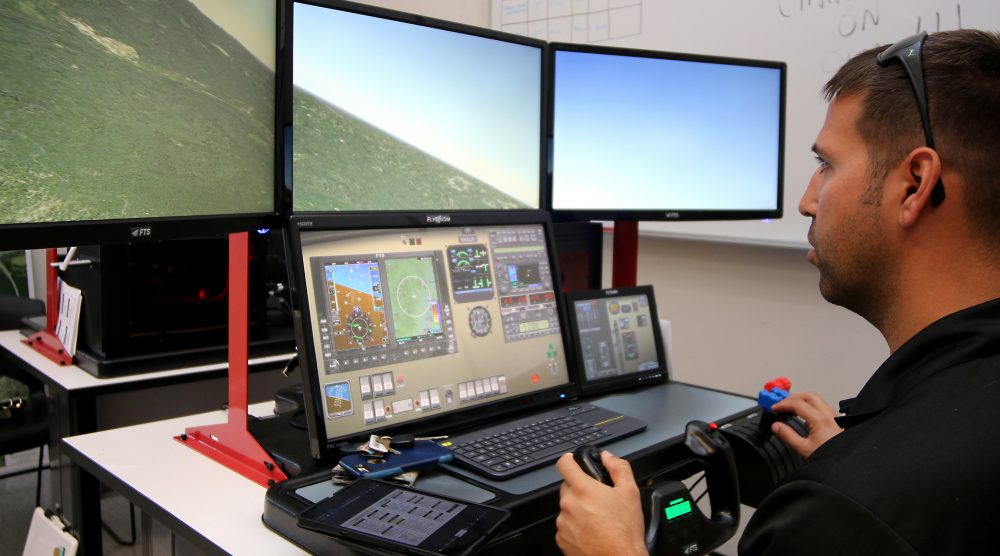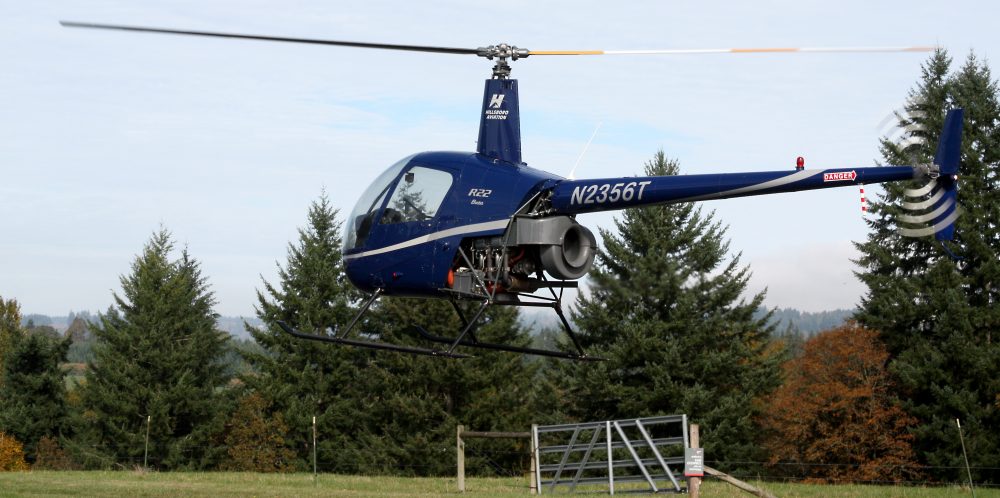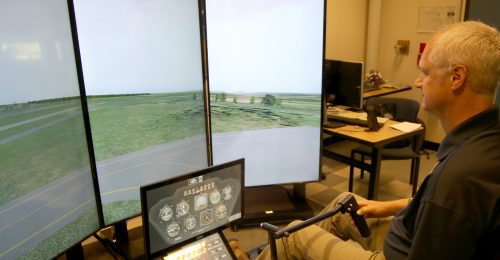This content was published: October 8, 2018. Phone numbers, email addresses, and other information may have changed.
New flight simulators enable PCC’s aviation students to fly on the ground
Photos and story by James Hill

Student Robert Udisky Cutter uses one of four fixed wing stations that re-creates the cockpit of Cessna and Piper airplanes.
A new way to train Portland Community College aviation students has been cleared for takeoff.
This summer, the college’s Aviation Science Program announced that it has installed six new flight simulators in its hangar on the Rock Creek Campus, 17705 NW Springville Road. The simulators, which together cost roughly $100,000, consist of four fixed wing stations (Cessna and Piper airplanes) and two rotary wing Robinson R-22 and R-44 helicopter simulators. These are specific aircraft that PCC students use at Hillsboro and Troutdale airports in their training.
The flight simulators are critical in guiding these students to completion. They gain valuable experience learning to overcome dangerous maneuvers and practicing standard airport taxiing protocols required by all major and regional airlines. Besides providing easy access to training in a safe environment, having the simulators in the program saves students money. Similar simulators at area airports can cost students approximately $60 an hour to use, with hundreds of dollars more per hour to rent a plane and have a flight instructor review similar situations and protocols.
“By prepping for their lessons so that they are actually ready to fly when they get out to the airport, we estimate we will save thousands of dollars per student,” said Larry Altree, faculty chair for the program. “There is a tendency for beginning pilots to go out and spend a lot of time just figuring out what the different controls do. Those wasted minutes can really hurt the student financially.
“We can get that out of the way here so they can focus right from the first lesson on actually flying the airplane or helicopter,” he continued. “This is the first of several steps we are taking to get costs of flying down.”
Besides cost, the simulation room gives students a way to fly year-round. Oregon is notorious for less than favorable weather at least half of the year, which makes flying under visual flight rules nearly impossible. PCC students can now head to the simulator room and practice flying VFR anytime, no matter whether it’s cloudy or sunny, warm or cold.
“When bad weather arrives, they can’t fly VFR,” said Kenneth Kleinfelter, an Aviation Science support technician. “But they can come in here and fly visually, and hopefully maintain some of that proficiency over the winter when skills like these can get stale.”The program is a gem for PCC, especially as it and the state’s other 16 community colleges prepare to ask the Oregon Legislature for $787 million to operate their budgets in 2019-21. The community college consortium is asking that $70 million of that total be used for career technical training like the Aviation Science Program to address worker shortages in the state.
The flight simulation room is just another reason why students gravitate toward PCC’s pilot training program and why investment in it pays off for the state. In addition to the simulators, the program has a high placement rate in the field with strong potential for advancement. Starting pay for a commercial airline pilot begins at $50,000 and increases to $100,000 annually within five years.
Beaverton resident Chris Morningstar, 26, joined the program in spring of 2017 and wants to use his aviation training to transfer into the Air Force. He credits his great grandfather for sparking his interest in becoming a pilot, and after discharge from the Army, Morningstar zeroed in on PCC. He’s now a regular in the simulation room as he hones his skills and works toward graduation.
“It’s been great to have these simulators,” he said. “They develop your multitasking skills, and you learn to handle situations that can arise in the cockpit. So when you do go out and fly, all of those situations are easier to handle.”
And, his favorite part of the simulator?
“Being able to pause it and use the bathroom,” Morningstar laughed.

A Robinson-22 helicopter comes in for a landing at Rock Creek. This is the type of aircraft that students train on in the new flight simulation room.

